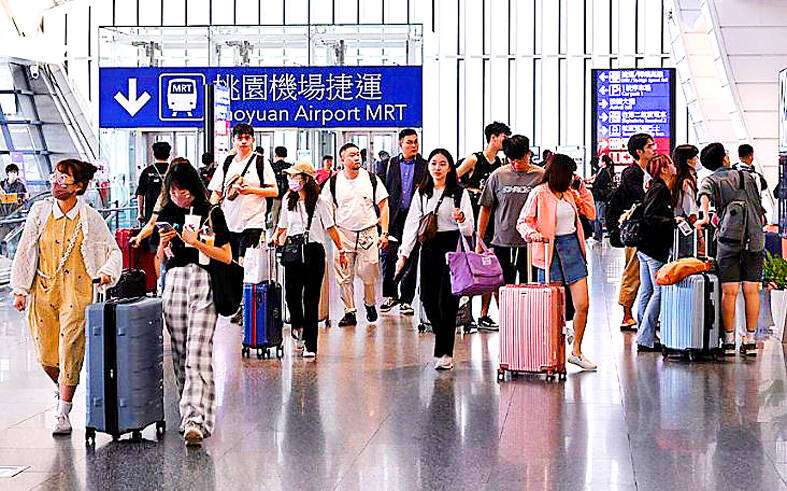Taiwan is soon to reopen its border to Chinese tourists coming from a third country as the government comes under pressure to break the impasse between Taipei and Beijing that has crippled cross-strait tourism, Premier Chen Chien-jen (陳建仁) said on Friday.
The idea to allow Chinese tourists traveling from a third place outside China has been under discussion within the government for quite a while, and details on how to implement the new policy would be announced soon, Chen said on Facebook on Friday evening.
Chen’s post came one day after business groups and local travel operators voiced their frustration at the impasse in cross-strait travel that began in 2016.

Photo: Liu Hsin-de, Taipei Times
Beijing has maintained its ban on group tours coming to Taiwan even after it announced on Thursday that it has added another 78 countries to the list of destinations where Chinese tourists are allowed to go on group tours after it loosened its COVID-19 travel restrictions in January.
Hsu Shu-po (許舒博), General Chamber of Commerce president on Thursday said that the government should step up efforts to end the stalemate in cross-strait relations.
Meanwhile, local travel agencies on the same day called on the government to extend an olive branch to Beijing by removing the ban on Taiwanese tour groups visiting China, a suggestion they have made multiple times before.
A source in the travel business, who asked to remain anonymous, on Thursday said that travel operators might take to the streets to make their voices heard if the government continues to remain unresponsive to their appeal.
The government initially responded to the exclusion of Taiwan on China’s list of 138 destinations for outbound group tours by repeating calls for Beijing to scrap the ban against the nation.
The government has urged China to open talks with Taiwan on resuming travel between the two sides on the basis of equality and reciprocity, to restore cross-strait exchanges in a healthy and orderly manner after the COVID-19 pandemic.
The government had expressed a wish to Beijing, before China’s announcement on Thursday, that both sides simultaneously lift their respective bans on tourists, but Beijing has yet to respond, officials said.
Since President Tsai Ing-wen (蔡英文) took office in May 2016, the country has seen a sharp decline in the number of Chinese tourists as a result of China gradually tightening its control and management of tourists to Taiwan, because Tsai refuses to endorse the notion of “one China.”
Beijing has banned Chinese tourists from traveling independently to Taiwan since Aug. 1, 2019, citing “current cross-strait relations,” and banned group travel in January 2020 at the beginning of the COVID-19 pandemic.
China’s ban also includes applicants to Taiwanese universities.
Taiwan allows individuals to go to China for travel or study.
However, Taiwan has maintained its ban on travel agencies organizing group travel to China, which was part of its COVID-19 control measures, and has not reopened its borders to Chinese tourists.

Chinese Nationalist Party (KMT) Chairman Eric Chu (朱立倫), spokeswoman Yang Chih-yu (楊智伃) and Legislator Hsieh Lung-chieh (謝龍介) would be summoned by police for questioning for leading an illegal assembly on Thursday evening last week, Minister of the Interior Liu Shyh-fang (劉世芳) said today. The three KMT officials led an assembly outside the Taipei City Prosecutors’ Office, a restricted area where public assembly is not allowed, protesting the questioning of several KMT staff and searches of KMT headquarters and offices in a recall petition forgery case. Chu, Yang and Hsieh are all suspected of contravening the Assembly and Parade Act (集會遊行法) by holding

PRAISE: Japanese visitor Takashi Kubota said the Taiwanese temple architecture images showcased in the AI Art Gallery were the most impressive displays he saw Taiwan does not have an official pavilion at the World Expo in Osaka, Japan, because of its diplomatic predicament, but the government-backed Tech World pavilion is drawing interest with its unique recreations of works by Taiwanese artists. The pavilion features an artificial intelligence (AI)-based art gallery showcasing works of famous Taiwanese artists from the Japanese colonial period using innovative technologies. Among its main simulated displays are Eastern gouache paintings by Chen Chin (陳進), Lin Yu-shan (林玉山) and Kuo Hsueh-hu (郭雪湖), who were the three young Taiwanese painters selected for the East Asian Painting exhibition in 1927. Gouache is a water-based

Taiwan would welcome the return of Honduras as a diplomatic ally if its next president decides to make such a move, Minister of Foreign Affairs Lin Chia-lung (林佳龍) said yesterday. “Of course, we would welcome Honduras if they want to restore diplomatic ties with Taiwan after their elections,” Lin said at a meeting of the legislature’s Foreign Affairs and National Defense Committee, when asked to comment on statements made by two of the three Honduran presidential candidates during the presidential campaign in the Central American country. Taiwan is paying close attention to the region as a whole in the wake of a

OFF-TARGET: More than 30,000 participants were expected to take part in the Games next month, but only 6,550 foreign and 19,400 Taiwanese athletes have registered Taipei city councilors yesterday blasted the organizers of next month’s World Masters Games over sudden timetable and venue changes, which they said have caused thousands of participants to back out of the international sporting event, among other organizational issues. They also cited visa delays and political interference by China as reasons many foreign athletes are requesting refunds for the event, to be held from May 17 to 30. Jointly organized by the Taipei and New Taipei City governments, the games have been rocked by numerous controversies since preparations began in 2020. Taipei City Councilor Lin Yen-feng (林延鳳) said yesterday that new measures by